Press Release



Need to institutionalize scholarly efforts: Jathedar Akal Takht
Referring to understanding the institutional significance of Akal Takht, he said that theorization of the supreme instit…
Book Release: Essays on Akal Takht – Tradition, History, and Conceptual Appraisals
Plymouth, Michigan, Saturday, March 05, 2022
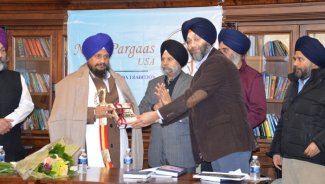
A dire need to foster scholarly effort among Sikhs was accentuated during the launch of new book Essays on Akal Takht – Tradition, History, and Conceptual Appraisals, edited by Amandeep Singh and published by Naad Pargaas USA. Attending the release ceremony of the book, Giani Harpreet Singh, Jathedar Akal Takht emphasized the importance of developing scholarship and the need to institutionalize efforts in research of Sikh studies. He mentioned that Sikhs have remained overwhelmingly involved in political debates and tensions, that has somewhere neglected the interests in scholarly domains among the members of the community.
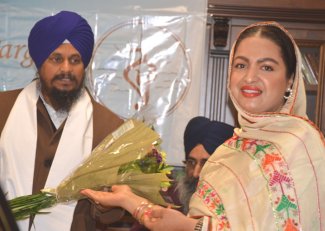
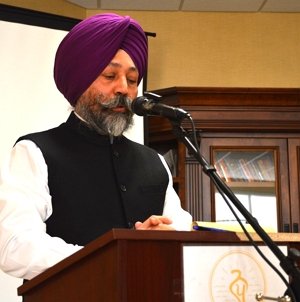
The program was inaugurated by a welcome speech by Dilbag Singh, (President – Mata Tripta ji Gurdwara committee). He said that the Gurdwara committee has always been forthcoming in bolstering open academic discussions by conducting seminars and conferences that are pivotal for cultivating an intellectual environment among Sikhs. On behalf of the committee he expressed his gratitude to Giani Harpreet Singh for gracing the occasion with his presence.
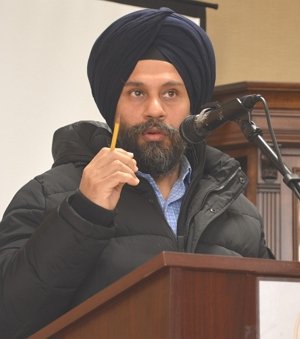
Discussing the contents of the book, Amandeep Singh said that the book is in continuation with his earlier work Akal Takht titled, Akal Takht: Revisiting Miri in Political Imagination, published in 2018. This book is a collection of most important essays that have been authored on Akal Takht, in the last century. These essays have been collected and compiled from diverse sources that are authored by Kapur Singh, Gurbhagat Singh, Jasbir Singh Ahluwalia, Bhupinder Singh and other renowned scholars in Sikh studies. Referring to understanding the institutional significance of Akal Takht, he said that theorization of the supreme institution of Sikhs is indispensable to interact in the modern world. It is the responsibility of Sikhs to initiate and foster an academic discourse on Akal Takht to overcome routine political behaviors that have overshadowed the spirit of the institution. He noted that it is perhaps time to look beyond the dualities of religion that many times is a source of political polarization. Comparing western modes of Secularism and Indian theory of Governance, he highlighted the concept of Dual Sovereignty, that renders a conceptual background to the idea of Akal Takht’s inauguration. He mentioned that both Miri (Temporality) and Piri (Spirituality) are independent domains that are neither divorced (as in Secular domain) nor married (as in Indian Theory of governance) in historical time. This relationship must be understood in meta-historical reference otherwise politics would continue to use religion for its own benefit or its vice versa, as was noticeable in Europe’s dark age and polarizing politics of concurrent times.
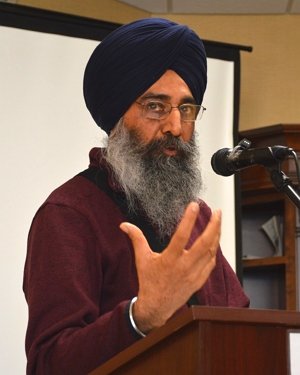
Giving insights on the book, Prof Jagdish Singh, from Naad Pargaas Sri Amritsar, highlighted that the principle of divine pulsation is represented in the institution of Akal Takht. The Guru bestows history in the process of linear time with inter convertibility of Sabda Philosophy and Naam Rasa universality. He said that this interconvertibility cannot be achieved without realizing the paradoxical nature of experiencing reality and metaphysics that are represented in Miri and Piri and further institutionalized in Akal Takht and Harimandir Sahib. He emphasized that it was imperative to approach Sikh philosophy in a serious academic environment while concentrating on understanding the convertibility of these domains. He gave specific examples of conceptual backgrounds and Sikh history to substantiate his claims.

Harjot Kaur (Convener, Naad Pargaas USA), thanked Giani Harpreet Singh, for being part of the book release ceremony. She highlighted the pivotal role of specific domains of Sabda philosophy that Naad Pargaas has encouraged while cultivating literary interest among the members of the community. She also laid a theoretical map that helps to conceive the institutional structure to promote research based on Sabda Philosophy. She mentioned that if Naad Pargaas USA receives adequate support of the Sangat in terms of its funding, the organization envisions to develop a model research institute for future generations of Sikhs in the West and in Punjab.
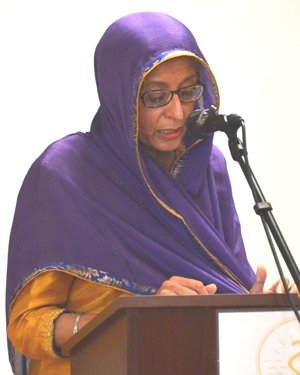
The program was concluded by the Word of Thanks from Raman Kaur (eminent member of the community), who appreciated the efforts of the Gurdwara Management committee and Naad Pargaas USA in organizing the seminar. Talking to the reports, she appealed to the Sangat to donate if possible on a monthly basis through the website of Naad Pargaas USA, so that serious academic research can be funded adequately and consistently.
Seminar on Zafarnameh conducted by Naad Pargaas USA
The Guru in Zafarnameh has dismantled that idea of racialized history of religion and reasserted the spirit of religion …
Feb, 12, 2022
Rochester Hills, Michigan
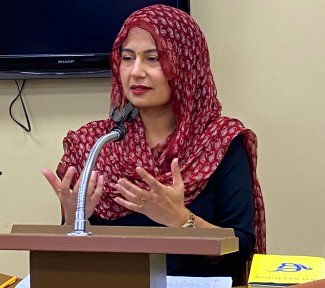
A seminar on Zafarnameh was conducted by Naad Pargaas USA at Sikh Gurdwara, Rochester Hills Michigan. Inaugurating the Seminar with welcome speech, Harjot Kaur, (Convener, Naad Pargaas USA), said that Zafarnameh has remained a central text to religious tradition of Sikhs. However, with passing time only a limited understating and interpretation of the text could be developed in academic discourses. She mentioned that the colonial modes of historiography have overshadowed the discourse on Sikh history and Sikhs must attempt to bring interpretation of history closer to Sabda Philosophy. In that background, Naad Pargaas USA has undertaken this attempt to re-engage with Zafernameh and understand its wider meaning that remains obscured in routine modes of approaching the text.
There were two papers that were presented in the seminar, followed by a question-and-answer session. In the first paper, Amandeep Singh, discussed three modes of approaching Zafarnameh- Literary, Historical, Conceptual. He discussed the underlying themes of oath, breaking of oath, the idea of a religious state and its implied nationalism. He said that interpreting Zafarnameh is not merely a mechanical enlisting of historical events where the Guru is challenging Mughal emperor Aurangzeb, but it is also an art of return to the religious belief system that the Guru presented to both Aurangzeb and hill rajas. Whenever a religious belief system is interpreted primarily in history, it triggers the process of the racialization of religion causing a comparative understanding of the idea of religions. In due course, this comparative understanding turns into an assertion of racial superiority that is often amalgamated with ethnicity to develop the idea of nation thereby producing a hyper sense of nationalism. The Guru in Zafarnameh has dismantled that idea of racialized history of religion and reasserted the spirit of religion back into history.
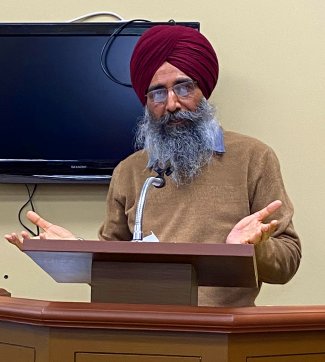
Prof Jagdish Singh presented the second paper in the seminar. He said that many times it becomes ambiguous to locate the spirit of text from its content and therefore, the form of the text becomes equally important. Discussing the transcendence from dark feminine into mother principle of Suhag Neeyam he laid down a map of different stages in which the art forms become expressible. He noted that it requires an empirical investigation to decode the sensuous experience in Sufi texts, like that of Bulleh Shah, which would usher a sense of Masti. This ticklish sense of Masti becomes dense in mystic experience but the Guru has transcended the Naam Rasa into Sabda philosophy bringing the Dasam Granth closer to the status of revelation. The process of the naming of God is therefore an essential element of Zafarnameh. He also laid down insights on Nameh tradition. Commenting upon the place of its writing at the abode of Desu Tarkan, he further added that the feudalized tribal psyche among the Sikhs has gained attractions of racial consciousness that has buried the essence of Zafarnameh in Sikh history making it a letter of asserting ego and celebrating historical glory. Its epistemological and philosophical meanings are nonetheless marginalized in the cacophony of its one-track interpretation.
The seminar was concluded by a word of thanks from the president of the Gurdwara committee Shubdev Singh.
Akal Takht in the Modern Age: Interview
I have always been thinking that as the supreme institution of Sikhs, Akal Takht is supposed to act as a beacon of light…
Feb 6, 2022
Below he interviews Amandeep Singh who is himself an independent researcher who has authored two books in the past: Celestial Grace (a work of prose and poetry) published in 2010, and Akal Takht: Revisiting Miri in Political Imagination (published in 2018). He writes regularly both in English and Punjabi. His articles are published in Routledge Journal, Sikh Formations, Punjabi Journal Kaav Shastar and poems in the punjabi news paper ‘Gurmukhi’. Recently, he has also authored an introduction to the famous classic The Spirit of Oriental Poetry, that was authored by Puran Singh. He is the Director of Naad Pargaas USA, which is 501(c)3 non-profit organization dedicated to understanding Śabda tradition and Naam inspired universality.
~~~~~~~~~~~~~~~~~~~~~~~~~~~~~~~~~~~~~~~~~
Question: Sikh history and literature are an ocean with endless exploration. Of all of the subjects you could choose from, what attracted you to the Akal Takht?
Amandeep Singh: I have always been thinking that as the supreme institution of Sikhs, Akal Takht is supposed to act as a beacon of light to guide temporal issues and offer a civilizational world view in any age. Therefore, for rediscovering the institutional significance according to the present age, there must be some theoretical discourse to relate historical reality of Akal Takht with the metaphysical idea behind its inauguration. I believe that no religious thought could productively flourish in isolation of its historical reality and no historical reality can render a meaningful idea in the vacuum of a conceptual discourse. Akal Takht is both an historical reality and metaphysical entity. Nevertheless, Sikhs are yet to realize its higher meaning beyond routine power struggles of (Sikh and Punjabi) politics. So, as a Sikh author, I believe it is perhaps my indispensable responsibility to rediscover its institutional significance in light of Sikh doctrines.
Question: I understand you went to India for its publication, Can you tell us about your journey to get to discover these essays?
Amandeep Singh- Honestly speaking, when I started my journey to dig out some serious academic material, I was very surprised to find a huge vacuum of such material, especially in the Western academic discourses. Take for example, The Oxford Handbook of Sikh Studies published in 2014, contains a total of fifty-one essays by different scholars, including eight specifically on Institutional Expressions, yet none is on the institution of Akal Takht. So, on discovering this vacuum, I turned towards authors of Punjab. Although, I found some books written by authors like Harjinder Singh Dalgeer, Balkar Singh, Roop Singh etc., nonetheless, these books could only render an account of Sikh history, or hukamnamas issued from Akal Takht etc. Once again my interest in search of conceptual discourse was not content with the material that surfaced. So, I started looking deeper for essays, articles, scholarly papers etc. and to my fortune by 2017, I discovered a few essays that were authored by Kapur Singh, Gurbhagat Singh and Jasbir Singh Ahluwalia. I found these essays engaging with my interests, offering theoretical explanations to the institution spirit of Akal Takht. This then encouraged me to develop some philosophical perspective on Akal Takht and I took this journey forward to author my first book on the subject in 2018, Akal Takht: Revisiting Miri in Political Imagination (available on Amazon.com and Amazon.in).
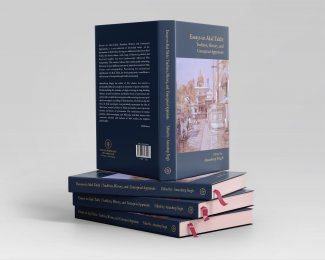
However, I voraciously continued to read further on this subject and sought to dig deeper in search of more relevant texts. I must say that I was fortunate enough that I had a guide and teacher Prof. Jagdish Singh, who helped me to dig out the seventeen essays that have been complied and presented in this upcoming book- Essays on Akal Takht- Tradition, History, and Conceptual Appraisals. I cannot thank him enough for discovering these essays that are now presented before the readers. Many of these essays have been collected from diverse sources, including books, Magazines, Journals, and newspaper articles.
Question: Can you give us a short background about the various Sikh authors compiled in the book?
Amandeep Singh- The perspectives developed by different authors from diverse backgrounds enumerate many ways to appreciate the institutional significance of Akal Takht. Most authors are academic scholars, historians, and political theorists. Sirdar Kapur Singh was a renowned theologian and thinker who was a bureaucrat of colonial and post-colonial India, before he became a politician. He has authored several books on religion, culture, and political philosophy. Jasbir Singh Ahluwalia, Gurbhagat Singh, Bhupinder Singh, and Davinder Singh are important scholars of Sikh Studies, who have contributed insightfully towards academic discourses of this age. These scholars have also authored books and essays on religion, critical theory, and philosophy. Surjit Singh Gandhi, has presented a perspective on historical conditions in which tradition of Sarbat Khalsa flourished and declined, while Karak Singh as an historian suggests some measures to resurrect the institutional significance of Akal Takht. Sukhbir Singh has presented popular political views and thereby places institutions as a signifier of routine political processes. Lakhvir Singh is a young scholar, pursuing his doctorate in philosophy. Drawing upon Foucault’s term ‘conduct of conduct’, he presents an interesting perspective on undercurrents of socio-political backgrounds that condition the nature of Sikh politics.
In short, the background motivations and assumptions of scholars are kneaded in the perspectives presented in these essays.
Questions: What stands out to you as the most powerful moments or discoveries during this research journey?
Amandeep Singh- Scholarly perspectives many times are quite different from the common popular narratives in socio-cultural discourses. This is primarily because scholars tend towards going behind the thick layers of everyday practices that overshadow our commonsensical approach. Take for example, the routine narratives among Sikhs approach the domain of Miri-Piri to propose some kind of marriage between the spirituality and temporality. However, when we read through the works of many scholars in this book, we can discover that both Miri and Piri are two independent domains of human life. In fact, at one occasion Kapur Singh contests that both these domains are actually antagonistic to each other. Such a claim is very different from the common perspective among Sikhs as Sikh politicians continue to draw a line of divide with secular ethics which propounds for a complete divorce between religion and politics. On the contrary traditional Indian theory of governance, while drawing its metaphysical connotation from Vedic philosophy proposes an internal marriage between both domains. Therefore, the socio-political narrative among Sikhs, in certain ways, is close to the Vedic philosophy, while Sikh scholars, interestingly, propose quite a different view on this.
Therefore, the institutions of Akal Takht and Harimandir Sahib that represent temporality and spirituality in Sikh metaphysics are not in complete isolation or in complete union. They are two different domains and that is why we have a system of dual sovereignty of Guru Panth and Guru Granth. Taking reference from these scholars, I have developed this thesis further in the introduction of this book.
Question- Can you tell us about the upcoming event where your new publication will be released?
Amandeep- The book will be released at Mata Triptaji Gurdwara Sahib, Plymouth, Michigan on March 05, 2022 from 10:00 AM to 1:00 PM. We will live stream the event on YouTube channel Naad Pargaas USA. I will be delivering an introductory talk on the book and Prof Jagdish Singh, who is with us from Naad Pargaas, Amritsar, will deliver a lecture. We are also trying to approach an eminent Sikh personality to join us during the launch of the book.
We would welcome members of the Sangat to join us through live stream (if not in person). Besides, I must mention that the book is available in India at Amazon.in and can also be ordered from Naad Pargaas, Sri Amritsar or from Singh Brothers, Sri Amritsar.
Question- Is there any message you would like to leave the sangat with?
Amandeep- Sikh Sangat has always been very enthusiastic to perform physically actionable forms of Seva. It is somewhat disheartening that there is negligible investment in intellectual pursuits thus far. Unfortunately, there is not a single world class university or research center of Sikhs that could potentially construct Sikh world view in the modern age. Nor do we have a world class library or publishing house to foster Sikh scholarship or promote scholarly interaction. This I believe is because Sikhs have not invested (both intellectually and materially) adequately in developing a relationship with texts and textual knowledge. There are hardly any libraries in Sikh homes. How then can Sikh thought interact contemplatively in the modern age?
Naad Pargaas USA and Naad Pargaas Sri Amritsar are striving to extend these static boundaries so that Sikhs can engage intellectually with World thought. No religious tradition can otherwise flourish in the vacuum of this intellectual journey. Sikhs need to note that there is no professional office where intellectual research in philosophy, literary studies, art, religion, critical theory, aesthetics, ethics etc., can be produced. Almost every religious community has developed its own research centers in the modern world in order to foster practical pragmatics of religious thought. So, I would leave it there for Sikhs to introspect and think of developing a class of scholars who can productively refine our political and intellectual vision. History, otherwise, can truthfully remain uncanny towards our future generations.
